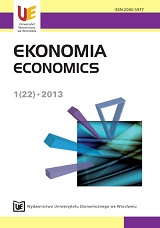Ekonomiczne przesłanki podnoszenia wieku emerytalnego w społeczeństwach europejskich
Economic circumstances of rising of the pension age in european societies
Author(s): Anna NiewiadomskaSubject(s): Economy
Published by: Wydawnictwo Uniwersytetu Ekonomicznego we Wrocławiu
Keywords: pension age; pension; ageing society; professional activity
Summary/Abstract: Population ageing is and is going to be the key demographic challenge for the majority of European countries in the next fifty years. The rising life expectancy and increased share of elderly people in the society lead to particular socio-economic consequences. One of them is the rise in the public expenses incurred on the pension system. In the face of demographic changes taking place and leading to imbalance between the financial resources contributed to the pension system and those which are spent, subsequent European countries decide to raise the retirement age. Instead of raising the retirement age, other solutions to cover the financing costs of fair pensions with funds raised from economic growth (and hence wage growth), personal taxes or VAT could be implemented. However, each of these solutions is more expensive than raising the retirement age, or impossible to achieve in the current economic circumstances. The fact that the planned and implemented changes in the regulations on retirement age are the appropriate way to deal with the demographic challenges is reflected in the recommendations of the European Commission. The Commission encourages EU countries to promote longer employment by linking the retirement age to life expectancy, reducing access to early retirement and closing the gap in the retirement age between men and women. It should be emphasized that the gradual raising of the retirement age is the solution necessary to sustain economic growth. In fact, most of the countries have noticed the decrease in their labour force as a result of low birth rates. The problem of dealing with the demographic challenge, therefore, comes down not only to raising the retirement age, but also to raising the level of labour force participation of the elderly people. The increase in the activity and employment of the elderly is necessary for the effective utilization of labour supply potential. The purpose of this article is to identify the main determinant factors behind raising the retirement age in European countries. Based on the statistical data short demographic characteristics of Europe are presented at the same time indicating the basic implications of demographic change with respect to the supply side of labour. Several dilemmas that are emphasized in the ongoing pension debates are also highlighted.
Journal: Ekonomia
- Issue Year: 2013
- Issue No: 22
- Page Range: 97-109
- Page Count: 13
- Language: Polish

